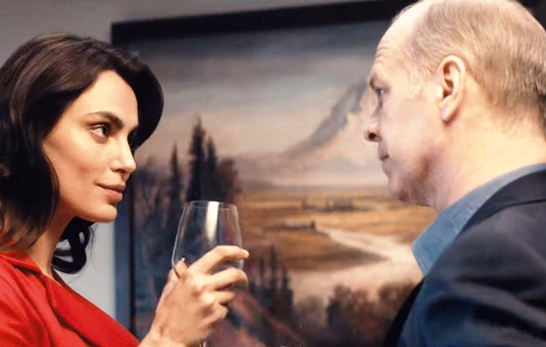 The moral no-man’s land of modern Romania is depicted in Corneliu Porumboiu’s latest picture as an ironic version of film noir.
The moral no-man’s land of modern Romania is depicted in Corneliu Porumboiu’s latest picture as an ironic version of film noir.
Romanian writer-director Corneliu Porumboiu is fascinated by the ways that language is used to wield power. He’s explored these themes in films that have political and psychological implications and that look inward at the act of moviemaking itself. In his latest film, The Whistlers, he’s taken on one of the classic genres that we tend to associate with Hollywood: film noir.
Vlad Ivanov plays Cristi, a Romanian cop who has traveled to the Canary Islands to meet up with some mysterious gangsters plotting the escape of their mob boss from a Bucharest prison. His contact is the beautiful Gilda, played by Catrinel Marlon, a seductive assassin with whom Cristi has an affair. There’s a weird reason why they’re in the Canary Islands: the crooks are there to learn a native language from that area, with an origin that stretches back many generations—a language composed completely of whistling. They will use this whistling language in order to coordinate their plot free of the danger of surveillance—the police won’t be able to figure out what they’re saying because, after all, it’s just a bunch of whistles. A scene where they begin teaching Cristi this language is very funny. The poor guy doesn’t know how to whistle. The key to making the right sounds, he is told, is to crook his finger like a pistol, and put it in his mouth as if he intended to shoot his right ear off. “Remember,” he’s told, “the tongue is under the finger.”
As it turns out, the story involves Gilda’s former partner, who has stashed thirty million dollars away somewhere, and Cristi’s supervisor, a female chief of police who has cameras and bugs installed in his apartment. Is Cristi actually working undercover for the chief, or has he turned rogue in order to help the gangsters and get the money?
This might sound kind of routine as crime pictures go, but Porumboiu’s dryly ironic dialogue and oblique visual style plays against the grain; and in addition, the film is divided into separate sections, each named after a different character, and with different color schemes. Gradually it dawns on you that these sections are not being shown to us in chronological order.
As much fun as the film is having playing around with neo-noir conventions, including an unusual amount of sex and violence for what seems like an art film, Porumboiu’s thematic concerns are still uniquely Romanian. The legacy of state surveillance and corruption makes the difference between the police and the criminals seem academic. Both sides use rhetoric to uphold their own place in the social order and condemn the other, with the bizarre whistling language representing forces that transcend ordinary means of control. Only Cristi and his femme fatale Gilda present the possibility of trust or connection. These two form the center of the story’s shifting mosaic.
Porumboiu does provide another anchor, however, for his morally compromised cop—Cristi’s aged mother, blissfully ignorant of what he’s up to, but always worrying about him. At one point he stashes a big bag of cash at her house; she finds it and donates the money to her local church. Thus we are brought down from the fantastic world of intrigue and double crosses into an hilariously mundane detail of domestic life. The picture also has a soundtrack that keeps surprising us, ranging from Iggy Pop’s “The Passenger” which opens the film, through electronica and French ballads to Offenbach’s “Tales of Hoffman.” Although The Whistlers seems like a light-hearted departure for a normally ponderous director, the emotionally fraught ending is satisfying in a serious way.

A 1999 film dramatized the real life story of a transgender man in a small Nebraska town, and it is still powerful and relevant...

The traditional way of beekeeping preserved by a Macedonian woman runs up against the modern motive for profit at all costs, in this gorgeous...

Alice Rohrwacher’s two-part fable portrays the fragility of goodness in a corrupted world. We’ve often heard about the problem of evil, framed in the...